In the past, doctors built their practices mostly through word-of-mouth, their local reputation, and being physically present in the community. Without a website, they had to rely on traditional methods like phone calls, referrals, and in-person visits to connect with patients and keep their practice thriving.
Today, the healthcare industry has changed.
Now, when patients need a doctor, they turn to the internet—searching for “best doctor near me” or browsing through search results to find a suitable healthcare provider.
If doctors don’t have an online presence, they are likely missing out on valuable opportunities to connect with these potential patients. That’s where a website comes into play.
Read more – Why Doctors Should Scale Up Their Digital Presence?
Without a website, a doctor’s practice is invisible to a large portion of their target audience. Having a website is a necessity for doctors today.
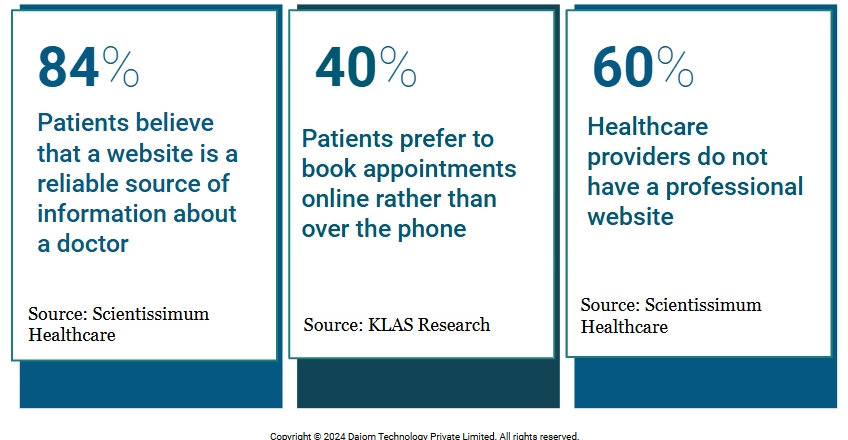
It’s the online clinic, available 24/7 to showcase the expertise, provide valuable information, and ultimately help patients find doctors more easily when they need.
This blog discusses why a website is crucial for doctors and how it can elevate their practice in the modern healthcare landscape.
A website is more than just a digital business card for doctors.
Table of Contents
1. Why is a Website Important for Doctors?
As more patients turn to the internet for health-related information, a well-structured website serves as a digital clinic that’s accessible 24/7.
It’s a place where patients can learn about a doctor’s qualifications, services, and how to get in touch, all from the comfort of their home.
For example: Dr. Sudhakar Prasad (Orthopedic Surgeon) built his own website to highlight his specialty in minimally invasive surgery. The site includes his bio, service information, and a contact form for patient inquiries, making it easy for patients to connect directly with him.
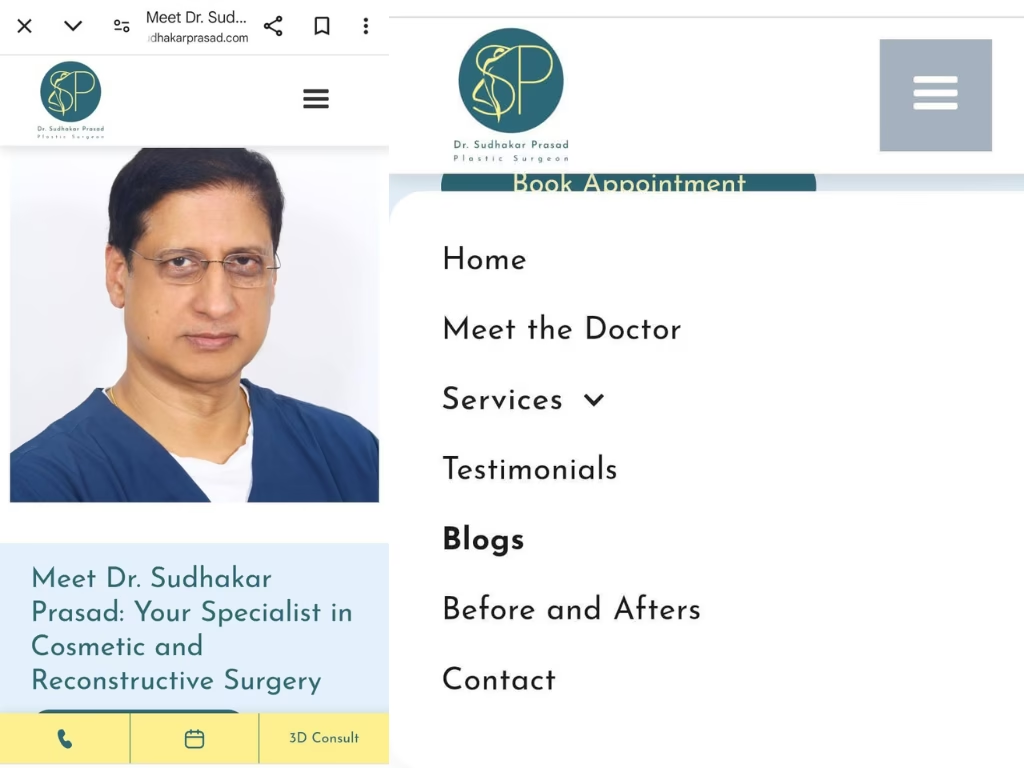
Doctors, healthcare marketers, and professionals all benefit from understanding how a website can transform the way patients find and engage with their services.
Here’s why a website is critical for doctors and healthcare professionals:
- Build Trust: A professional website enhances credibility. Patients trust doctors who have a well-maintained online presence. By showcasing qualifications, experience, and patient testimonials, a website helps to build a connection with potential patients before they even step foot in the office.
- Make Services Easy to Find: With a website, patients can quickly find essential information—like contact details, services offered, and appointment scheduling—without the need for multiple phone calls or in-person visits. It simplifies the process for both patients and the healthcare provider’s team, saving time and effort for everyone. Also Read – Why Should Doctors Leverage Social Media Today?
- Stay Ahead of Competitors: The internet has become the go-to place for patients searching for healthcare providers. Studies show that 73% of patients now look online when choosing a doctor. Without a website, healthcare providers risk losing out to competitors who have a digital presence and are easier to find.
- Educate Patients: A website offers the perfect platform to educate patients about common health concerns, explain procedures, and share helpful tips. By providing valuable information, doctors can create an informed and engaged patient base, which can lead to better care and stronger patient relationships.
- Reach More People: With proper Search Engine Optimization (SEO), a website can attract patients not just from the local area, but from a broader region. A well-optimized website makes it easier for patients to find a doctor when searching for specific specialties, procedures, or health concerns.
2. What Should a Doctor’s Website Include?
Creating an effective website for a medical practice doesn’t have to be complicated.
For doctors, healthcare professionals, and marketers, knowing the essential elements of a website ensures it meets the needs of both the practice and its patients.
Here are the key features that should be included in every doctor’s website:
2.1 About Section
A section dedicated to showcasing the doctor’s qualifications, experience, and philosophy of care is vital. This helps build trust and lets patients know what to expect from their visit. Highlighting any special training or areas of expertise can further set a practice apart.
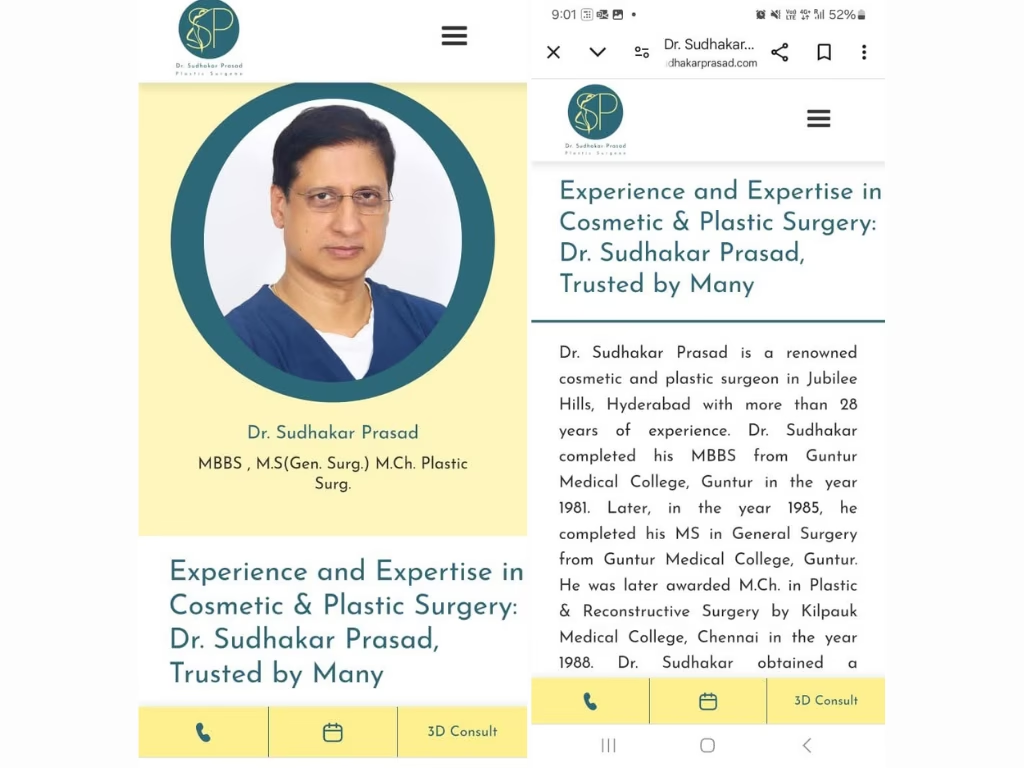
2.2 Service Page
It’s important to clearly list the treatments, specialties, and services provided. This allows potential patients to quickly identify whether the doctor can meet their specific healthcare needs. The more specific and clear the service descriptions, the better.
2.3 Online Booking Page
An easy-to-use online booking system can save time for both staff and patients. This feature allows patients to schedule, reschedule, or cancel appointments at their convenience, reducing the number of phone calls and administrative work.
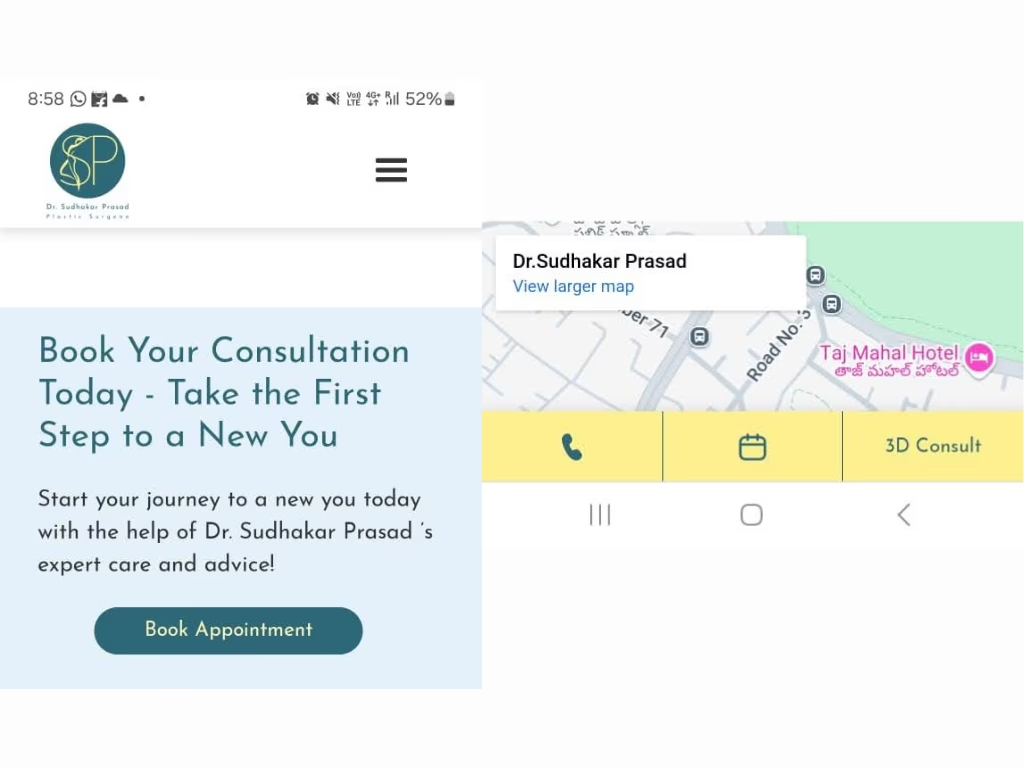
2.4 Patient Testimonials
Including positive reviews or testimonials from patients helps build credibility. When new patients see others sharing their experiences, it can significantly influence their decision to schedule an appointment. Real stories from real patients foster trust and reassurance.
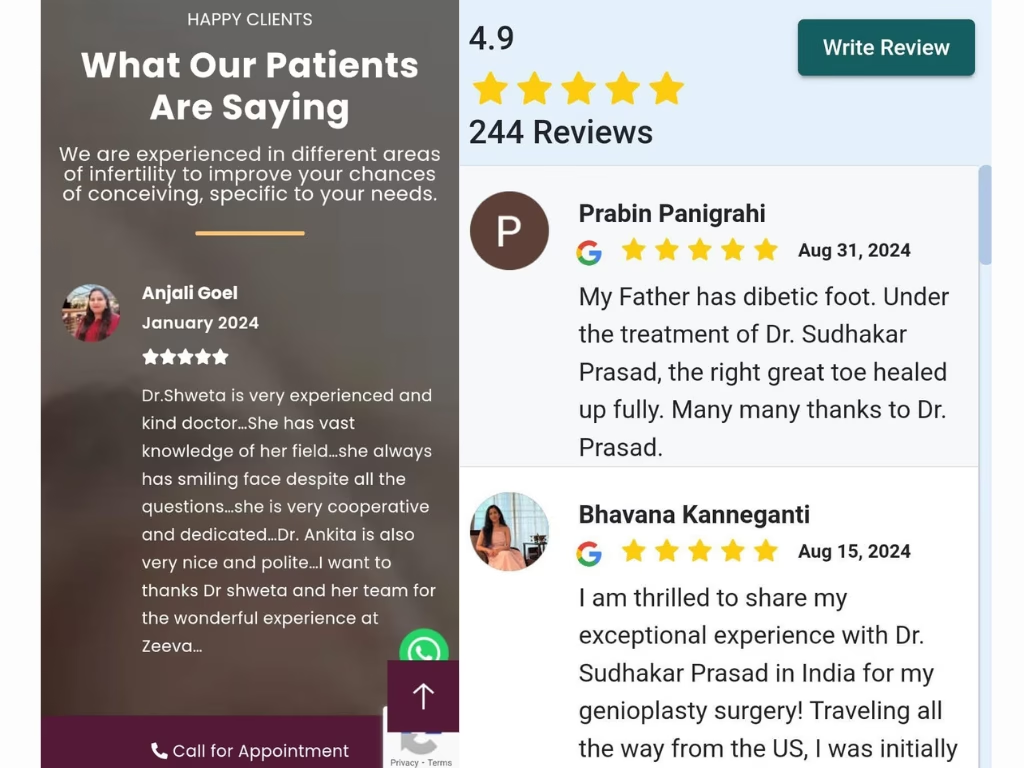
2.5 Health Tips or Blog Section
Providing educational content, such as health tips or blog posts, is a great way to engage with patients. It demonstrates expertise and offers valuable information, which can encourage patients to return to the website for advice or updates on medical conditions and treatments.

2.6 Contact Page
Clear and easy-to-find contact information is crucial. This includes the phone number, email address, and physical location of the practice. Making this information accessible ensures patients can get in touch with minimal effort.
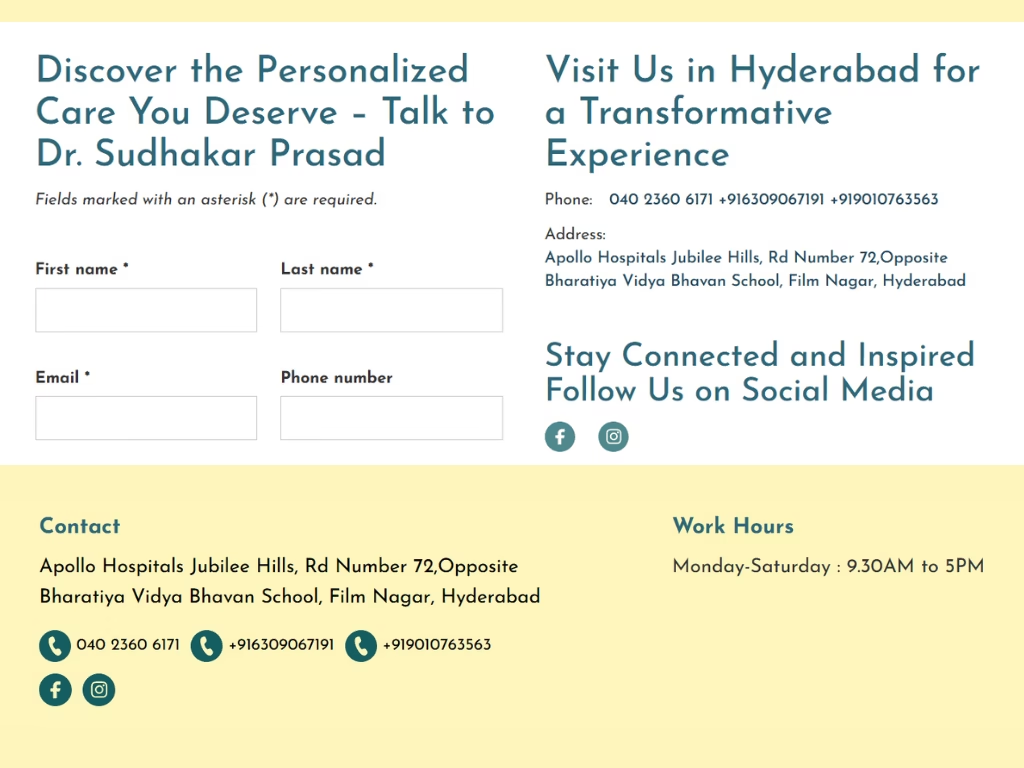
3. How to Implement SEO Strategies for a Doctor’s Website?
Search Engine Optimization (SEO) is essential for ensuring that a medical practice website is visible when potential patients search for healthcare services online.
A well-optimized website can significantly boost its visibility, attract more traffic, and contribute to practice growth.
Below are key SEO strategies that can help improve a website’s discoverability:
3.1 Keyword Research
Effective keyword research is the foundation of SEO. Identifying the right terms potential patients are searching for can drive targeted traffic to a website.
- Primary Keywords: Broad terms like “doctor in Bangalore,” “medical practice,” and “healthcare services.”
- Long-Tail Keywords: More specific phrases, such as “pediatrician near me” or “best cardiologist near me,” help attract patients seeking particular services.
3.2 On-Page SEO
On-page SEO optimizes individual pages of the website to rank higher in search engine results.
- Title Tags and Meta Descriptions: Craft compelling title tags and meta descriptions using primary keywords to improve click-through rates.
- Header Tags: Use header tags (H1, H2, H3) to structure content for better readability by both search engines and visitors.
- Keyword Integration: Integrate relevant keywords naturally within the content to ensure it reads well and provides value to the audience.
- Alt Text for Images: Add descriptive alt text to images to improve accessibility and help search engines understand the content of visual elements.
3.3 Local SEO
Local SEO is especially important for medical practices aiming to attract patients within their area.
- Google My Business: Claim and optimize the Google My Business listing with accurate practice details, photos, and patient reviews.
- Local Keywords: Incorporate location-specific keywords throughout the website content and meta tags to improve local search visibility.
- Citations: Ensure the practice is listed in relevant local directories and healthcare-specific websites to further boost local SEO efforts.
Read more – Local SEO: Marketing strategy to convert Online traffic to Offline
3.4 Content Marketing
Creating high-quality content is key to building authority and engaging with potential patients.
- Blog Posts: Publish informative blog posts that address common patient concerns and relevant topics within the medical specialty.
- Educational Videos: Create videos that explain medical procedures or offer health tips.
- Infographics: Use infographics to simplify complex medical information, making it easier for patients to understand.
For example: Dr. Shweta Goswami (IVF Specialist) has a website that provides detailed information on fertility treatments and features success stories. Patients can easily book appointments and access blogs explaining complex fertility procedures.

3.5 Technical SEO
Technical SEO ensures the website is optimized from a technical standpoint for search engine performance.
- Site Speed: Improve website loading times by compressing images, minimizing code, and selecting a reliable hosting provider.
- Mobile Optimization: Ensure the website is fully mobile-optimized since many patients will access it from their smartphones.
- XML Sitemap: Submit an XML sitemap to search engines to aid in indexing the pages efficiently and improving overall searchability.
By implementing these strategies, medical practices can increase their online visibility, attract more patients, and effectively grow their practice in a competitive healthcare market.
4. Common Mistakes to Avoid on a Doctor’s Website
When building or maintaining a doctor’s website, it’s easy to overlook certain details. However, small mistakes can lead to significant issues that affect patient experience and engagement.
To ensure a seamless online presence that attracts and retains patients, here are some common mistakes to avoid:
- Outdated Information: Accurate and up-to-date contact details and service information are essential. Patients can get frustrated with outdated information and may look elsewhere for care.
- Poor Navigation: Simple, intuitive menus are crucial for helping patients quickly find the information they need. A confusing layout can cause frustration and drive potential patients away.
- No Mobile Version: Many patients search for doctors on their mobile devices. If a website isn’t mobile-friendly, it can result in missed opportunities and a negative user experience.
- Slow Loading Times: A slow website can cause patients to leave before fully exploring the services. Optimizing images and content for faster loading speeds is essential to keep patients engaged.
5. Conclusion
A website is much more than just an online presence; it serves as a vital tool for doctors to connect with patients, build trust, and grow their practice.
With the right features and regular updates, a well-designed website can help a medical practice stand out in today’s competitive healthcare environment.
It makes it easier for patients to find essential information, book appointments, and learn more about the services offered.
By building a website, doctors can establish a strong digital presence, making their practice more accessible and engaging to potential patients.
If you’d like to discuss how we can help enhance your customer retention and optimize your strategies, we’d be happy to set up a consultation call. Feel free to reach out to us at alibha@daiom.in
For more informative content and blog, follow and stay tuned to DAiOM.
Subscribe to our NEWSLETTER!


